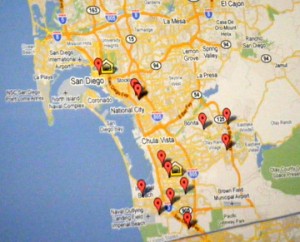
Murders in broad daylight, kidnappings, vengeance, death threats in the form of a dead dog at a doorstep or a tombstone ripped out of a cemetery; corrupt cops delivering drugs, the purchase of grenades, military uniforms and even the attack of a CHP patrol car with a golden Escalade.
No, this is not Tijuana, but San Diego, Chula Vista, Imperial Beach and Poway, where powerful drug lords have taken refuge from police prosecution and escalating violence and confrontation with rival cartels.
In this parallel world, operating right in the middle of the otherwise peaceful southern California landscape, “the office” is the Cartel’s headquarters in Chula Vista, “large visa” is the opportunity to traffic large drug shipments and “baby carriages” are women who hide the drugs in their bodies while crossing the border.
“The persecution by Mexican authorities and the escalating confrontations among rival cartels have lead organized crime North” said US Attorney Laura E. Duffy, “their arrival here [into the US] allowed us to use techniques such as wiretaps, searches, body wires and cameras, all admissible evidence against these people in court, and a clear message not to mess with border communities” she added.
The problem has been growing so fast, authorities obtained a grant to create the San Diego Cross Border Violence Task Force six months ago, gathering forces from ATF, FBI, DEA, DHS, CHP, and all of the city police forces in the county.
In their first operation, called “Green Light,” 43 people —including eight women— are accused of being part of the Fernando Sanchez Arellano Organization (FSO), an offshoot of the infamous Arellano-Felix drug-trafficking cartel.
31 out of the 43 people charged with racketeering and other crimes have now been arrested. The 12 others —including the two bosses who are said to be hiding away in Jalisco— are still at large.
The wide and intense operation had undercover agents and at least two informants, 9 FBI teams and 29 arrest teams, whom managed to avoid 25 violent acts including 8 murders, two of them from Tijuana cops.
15 locations were searched and 40 telephone numbers wiretapped that resulted in 50,000 hours of taped conversations talking about murders, rapes, traffic, corruption and even the sale of the official Baja California State Police directory for a measly thousand dollars.
Complex bi-national operations
Half of those arrested in the “Luz Verde” case are San Diego residents, who lived in houses and apartments in Chula Vista, Imperial Beach, Colton, Moreno Valley, and the city of San Diego.
Amongst those arrested was the Baja California agent in charge for the State Prosecutors international liaison unit, Jesus Quiñones Marques, an active investigator and a few Tijuana ex-cops, all accused of working for the mafia by providing info, protection and even prosecution for the ASO.
Márquez was arrested in San Diego after being invited to a “collaboration meeting,” and is now accused of having obtained and shared information from US agencies and giving it over to cartel members, as well as giving lists of fellow cops and ASO rivals.
According to the 79 page long complaint, the cartel works under a clear but flexible structure where “los señores” are the bosses of the cartel, followed by the lieutenants and corrupt Mexican officials in charge of providing key information to the cartels and making sure arrested members go free, while rival members do not.
In this case, the “señores” in the group are Fernando Sanchez Arellano and his right arm, Armando Villareal Heredia, aka “El Gordo” whom together order at least 10 lieutenants, including Alicia Martinez, a woman who took her husbands’ place after he was arrested. Other than her, most women are low-ranking members, in charge of seducing victims and rivals, traffic drugs in their bodies or keep a detailed account of drugs and pending payments.
The wide spread case shows a vulnerable border, tied in more ways than before where US authorities will have an increased roll in persecuting cartels in the area.
“Today…all levels of goverment worked in unison to combat this dangerous and violent criminal enterprise and we are rewarded with dozens of arrests that truly have an impacto n safety and well-being within our local communities,” said FBI director in San Diego Keith Slotter.
The author of the article chose to remain anonymous for safety reasons.